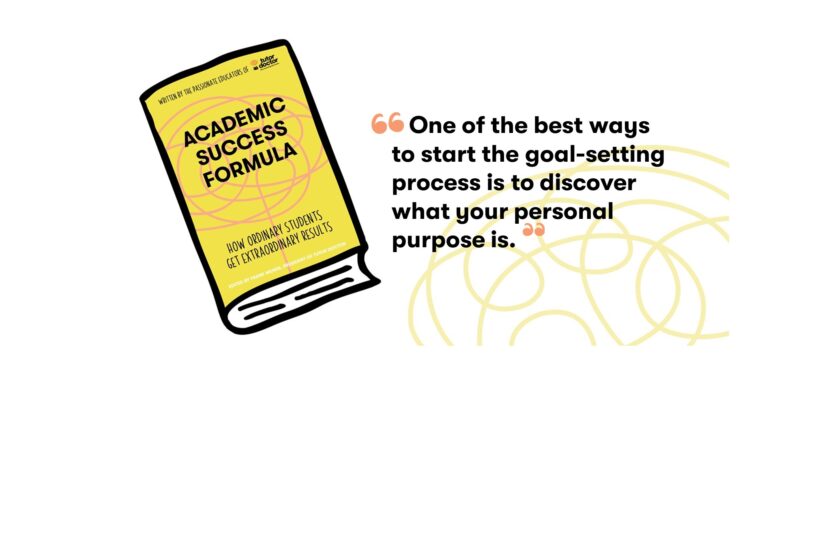This blog post provides a great summary of a chapter from our recently published book, Academic Success Formula: How ordinary students get extraordinary results. The chapter was written by Ashley Mulcahy, a Tutor Doctor franchisee out of Orange County, California, who has more than 100 tutors in 20 cities.
Author Stephen Covey believes that all things are created twice – first, we imagine things in our mind, and then we can take the steps to make them a physical reality. This same concept applies to setting goals – without an end target in mind, it can be very difficult to determine what path we need to take to succeed. Imagining where you’d like to be later in life gives you a distinctive end goal to work towards. Using this future image as reference, we can begin to create a “blueprint” for our lives.
Why is setting goals important? Too often people believe that life happens “to” them, and that luck plays a larger role in achieving success than it really does. For example – if another student at your child’s school graduated valedictorian, it’s not uncommon for a parent to think, “Why can’t my child be like that?” We often mistakenly assume someone’s just got “good math genes” or must’ve been born “smart.” However, we never really get to see what happened behind-the-scenes – the multiple late-night study sessions and years of academic diligence – that more likely led the student to their success.
It’s also important to make sure goals are specific, and not too abstract. For example, “getting good grades” is not an end goal, but rather a part of the blueprint that will ultimately help to achieve the end in mind. At Tutor Doctor, we prefer to hear goals from our students more like, “I want to be a veterinarian!” Then the student can begin to start mapping out the steps, moving backwards, of what is required to achieve that end goal. Undoubtedly, getting good grades will play an integral role in gaining acceptance to veterinary school – but remember that the grades themselves are just part of the process, and not the final accomplishment! Even considering 75% of college students will change their major at least once, the important part is having that end vision in mind to be worked towards.
So, what are some good ways to set goals? One method is to make a “vision board” – a visual representation of your goals, including (but not limited to) relationships, finance, career, travel, home, and anything else related to personal growth. Try putting pictures on a poster board to represent these goals. This can serve as a great visual, constant reminder of your end goals!
Writing down your goals (and the steps needed to get there) is also a great way to start planning, and studies have shown that people that write down their goals are more likely to achieve them. Don’t be afraid to dream! To get started, here are five things to keep in mind to help set your goals effectively:
- Specificity: Goals that have specific performance standards are more likely to be achieved than general goals. For example, let’s say a student that is struggling in algebra has an important test they need to get a certain score on to pass the class. Rather than a vague goal like “I’ll try my best,” it’s better to specify something more measurable – “I’d like to get a C or better.”
- Proximity: Consider how far away (in terms of time) the goal is from completion. Sometimes it can be better to set short-term goals, or steps, that will be required to eventually accomplish the larger, long-term goal. Short-term goals can be more manageable, and as a result foster higher motivation and better self-regulation moving forward.
- Difficulty: Surprisingly, difficulty does not directly affect performance. However, it is important to choose a realistic goal that you believe you possess (or can attain) the necessary skills to achieve. In fact, studies show that goals that are overly easy don’t motivate us much at all, and neither do goals that we consider “impossible.” It’s okay to dream big, but don’t overwhelm yourself, and make sure adjust your strategy as needed!
- Personal Mission Statement: A great way to tie your goals together is to write a personal mission statement. Not only does this help you to reflect on your character, but also provides valuable insight into your inner principles and core values. Self-regulation is an important part of achieving your goals, and a personal mission statement can be useful to reference when making difficult choices and decisions in life.
- Reward Yourself: Don’t forget to reward yourself for accomplishing your goals, as rewards are an extremely effective motivator! You can even break down larger goals into smaller incentives to stay motivated. For example, say you have a big test coming up that will require a lot of studying. Your goal is to get a B on the exam. Get creative! Perhaps reward yourself with your favorite drink by planning study sessions at a coffee house. Giving yourself something to look forward to is a huge part of staying motivated!
As we say here at Tutor Doctor, “you’re never too young to start.” The earlier we start setting goals for our future, the sooner we can start taking the path to success!




